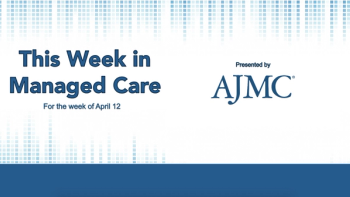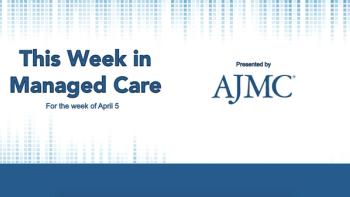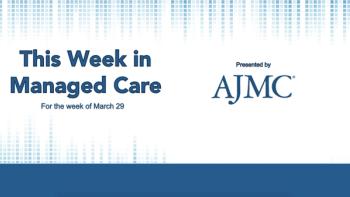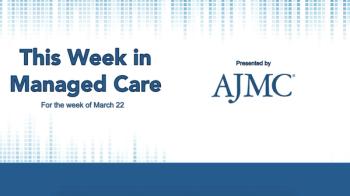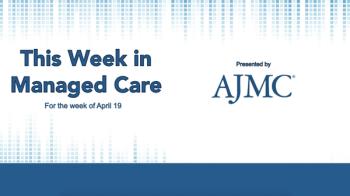
This Week in Managed Care: January 29, 2021
This week, the top managed care news included Biden reopening Affordable Care Act insurance marketplaces; medical claim denial rates highest in initial COVID-19 hotspots; obesity linked with mortality in acute lymphoblastic leukemia.
Biden reopens Affordable Care Act insurance marketplaces; medical claim denial rates rising, highest in initial COVID-19 hotspots; and obesity is linked with higher mortality rates in patients with acute lymphoblastic leukemia.
Welcome to This Week in Managed Care, I’m Matthew Gavidia.
Biden Reopens ACA Enrollment, Rescinds Global Gag Rule, Will Reexamine Work Requirements
This week, President Joe Biden reopened enrollment on Healthcare.gov, the federal marketplace for Affordable Care Act health plans. In addition, his executive order directed agencies to take another look at access to Medicaid, including work requirements, which were adopted by some states under new policies during the Trump administration.
The reopening of HealthCare.gov will run from February 15 to May 15 in an effort to assist Americans who lost their health insurance as a result of job losses or other factors stemming from the COVID-19 pandemic. This new enrollment period will not require a change in life circumstance and will in fact be longer than the usual 6-week enrollment period, which ended in December.
Another order immediately rescinds the global gag rule, also referred to as the Mexico City Policy, which bars international nonprofits that provide abortion counseling or referrals from receiving US funding.
Other orders issued by the president include creating an office of health and climate equity in HHS as part of a new focus on the health effects of climate change and also environmental justice for disadvantaged communities. Another order reinstated a travel ban, which was lifted by President Trump shortly before he left office, on most non-US citizens who recently visited South Africa, the United Kingdom, and Brazil, amid the emergence of more infectious COVID-19 variants reported in these countries.
For more,
Medical Claim Denial Rates Rising, Highest in Initial COVID-19 Hotspots
In report findings published last week, medical claim denials have risen 11% nationwide since the onset of the pandemic, with the most denial rates found in the Pacific Coast and the Northeast, 2 regions with the highest first wave of COVID-19 outbreaks.
Reported in the Change Healthcare 2020 Revenue Cycle Denials Index, the analysis included 102 million hospital transactions totaling $407 billion in charges that were processed from July 2019 through June 2020.
Compared with medical claim data of the 2017 Denials Index report, the third quarter of 2020 showed a 23% increase in total medical claim denials, marking a 11.1% increase in the national rate of claims denied upon initial submission.
Nicholas Raup, associate vice president of Product Management and Revenue Cycle at Change Healthcare, notes that for every denial cause besides medical documentation requested, the percentage of potentially avoidable denials nearly matches the percentage of each denial category. In other words, most factors contributing to medical claim denials can be avoided.
To address these issues, Raup says that providers need to implement a denials-prevention strategy for front-end processes that includes staff education and training and the use of advanced technology.
“This approach can help cut denials dramatically and, in turn, the time and expense associated with appeals and the risk of lost revenue,” said Raup.
The study authors additionally provided 5 tips to reduce rates of avoidable medical claim denials:
• determine where denials are originating and their root causes
• prioritize remediation based on where and what actions will have the greatest impact
• consolidate revenue cycle technology with a single “end to end” vendor
• benefit from advanced analytics and artificial intelligence
• choose the right partner
For more,
Obesity Likely to Adversely Affect Survival Among Patients With ALL
According to a recent study of patients treated at Mayo Clinic, higher mortality rates were seen among patients with acute lymphoblastic leukemia, or ALL, who were considered obese per World Health Organization standards.
Published in Blood and Lymphatic Cancer: Targets and Therapy, results of the retrospective cohort study show an overall mortality rate among obese patients with ALL that is more than 1.5 times that of nonobese patients.
“Current risk classification strategies are based primarily on age as well as the analysis of genetic abnormalities of leukemic blasts and careful monitoring of each patient’s response to therapy,” said the study authors. “However, certain clinical features, such as obesity, which are not typically used for risk stratification, are also associated with outcomes of acute leukemia.”
A subanalysis from the study also shows that this risk is even more apparent among the patients who have T-cell ALL who are considered obese, in which the overall mortality rate among these patient populations was more than 3 times that of their nonobese counterparts.
Event-free survival, or EFS, was also noted to be 2.5 times lower in the obese patients, who were more likely to be women and at least 60 years old.
The authors note that their findings conflict with those of similar studies conducted among children and adults. Mortality differences for overall survival, EFS, and relapse were not seen among 4 groups of children from St. Jude Children’s Research Hospital whose weight ranged from underweight to overweight classifications. And 2 other studies performed among adults did not find a link between obesity and decreased survival or increased toxicities from treatment.
For more,
Mental Health Dangers for the Front Lines During COVID-19
Since the first wave of the COVID-19 pandemic began in the United States in late winter and early spring last year, health care workers and first responders have reported extreme amounts of stress.
In this week’s Managed Care Cast, we speak with Dr Andrew Smith, a coauthor of a study published in the Journal of Psychiatric Research that surveyed first responders, including police officers, firefighters, emergency medical technicians, and health care workers from 2 counties in Utah and Colorado in April and early May 2020, before that region experienced its first surge of cases.
In their findings, first responders were indicated to be at risk for psychiatric illnesses at severity levels higher than other national disasters, including 9/11 and Hurricane Katrina.
For the podcast,
For all of us at AJMC®, I’m Matthew Gavidia. Thanks for joining us!
Newsletter
Stay ahead of policy, cost, and value—subscribe to AJMC for expert insights at the intersection of clinical care and health economics.
